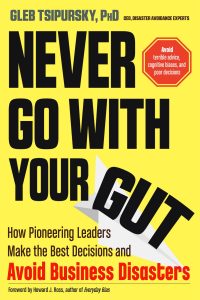Podcast: Play in new window | Download
Subscribe: RSS
How do you make the best decisions as a leader?

Gleb Tsipursky
Dr. Gleb Tsipursky is the author of the best selling book, Never Go with Your Gut: How Pioneering Leaders Make the Best Decisions and Avoid Business Disasters (Avoid Terrible Advice, Cognitive Biases, and Poor Decisions).
Known as the disaster avoidance expert, Gleb’s mission is to protect leaders from judgment errors through effective decision making.
As the CEO of his company, Gleb has over 20 years of experience in consulting, coaching, and training. He also has over 15 years of experience in academia as a cognitive neuroscientist and behavioral economist.
What We Discuss With Gleb Tsipursky In This Episode
- How to avoid decision disasters
- How leaders make decisions
- Examples of bad strategic decision-making by top leadership leading to bankruptcy versus good strategic decision-making leading to success
- How to overcome our different cognitive biases
- Factors that cause us to make bad decisions
Episode Transcript Highlights
How Leaders Typically Make Decisions
A typical style for how leaders make decisions is to go with your gut. Follow your intuition. Trust yourself. Trust your heart. Whatever modality you use, do what you’re comfortable with. Do what your emotions tell you is right. So when you feel something is right, you do it because you believe it’s right.
According to extensive research in cognitive neuroscience, the more important the decision is, the more likely that the top leader is to make it without listening to others or gathering sufficient data. In other words, they will go forward because of what their intuition or gut reaction tells them.
This is a terrible way of decision making.
Notwithstanding, there are also leaders who have made great decisions using their gut. A broken clock is right twice a day as well. But you don’t want to trust a broken clock to make the right decisions. If you go with your gut and against using the data and analysis, you’ll make really bad decisions.
Why Many Startups Fail
If you look at the history of small startups, you’ll see a pretty persistent success and failure rate. About half of them fail within the first five years, about two-thirds of them fail within the first 10 years, and about three-quarters of them fail within the first 15 years. And that’s because entrepreneurs very often go with their gut. On the contrary, seasoned business leaders know their gut often leads them in the wrong direction.
How to Overcome Cognitive Biases
One of the dangerous judgment patterns is called hyperbolic discounting. It’s a cognitive bias where we discount the long-term future with higher returns for the sake of short-term returns.
Separate the feelings from the decision-making process itself. We need to have a very clear, strategic approach to decisions where feelings are incredibly important in determining our values, what we care about, and the goals of the company. But you need to separate out the emotions from the specific tactics that you will pursue in the decision-making process because your emotions very often will lead you to make bad decisions.
Realize where you are making mistakes. Our emotions, instincts, intuitions, or gut reactions are actually not adapted for the modern business environment. They’re adapted for the savanna environment.
Another pattern that’s common among entrepreneurs is optimism bias. It’s when you think the grass is greener on the other side of the hill and you think all ideas are brilliant. To avoid this, hire people who are pessimists, risk-averse, and more likely to see threats. Then collaborate with them effectively because they bring a different perspective.
Factors that Cause Us to Make Bad Decisions
- Fight or Flight Response: We’re very tempted to make very quick decisions that are either defensive or aggressive in response to external negative stimuli.
- Tribalism: Working with people who only look like you and think like you, and so on, is very bad in the modern business environment. And it’s very tempting for us to do that. However, you don’t need more of the same strengths. You need to make counterintuitive hires where people complement your strengths and where they address your weaknesses.
How to Avoid Decision Disasters
Here are five questions you need to ask yourself before making any decision:
- What important information have you not fully considered?
- What cognitive biases might be involved in the situation?
- Trust an objective advisor telling you.
- Think about what would you tell a friend in this situation to do.
- What information will cause me to change my mind?
Episode Resources
- Never Go With Your Gut: How Pioneering Leaders Make the Best Decisions and Avoid Business Disasters
- https://mix.com/gleb_tsipursky
Connect With Gleb Tsipursky
- Website: http://disasteravoidanceexperts.com
- LinkedIn https://www.linkedin.com/in/dr-gleb-tsipursky
- Twitter https://twitter.com/Gleb_Tsipursky
- Instagram https://www.instagram.com/dr_gleb_tsipursky
- Facebook https://www.facebook.com/DrGlebTsipursky
- Youtube https://www.youtube.com/channel/UClfR0oE9ZbMtvxkDOCR89nA
Did You Enjoy The Podcast?
If you enjoyed this episode please let us know! 5-star reviews for the Leaders Of Transformation podcast on Apple Podcasts, Spotify, Pandora or Stitcher are greatly appreciated. This helps us reach more purpose-driven entrepreneurs seeking to make a positive impact in the world. Thank you. Together, we make a difference!
Additional Episodes You May Like
- 303: Dr. Louis Rosenberg: Using Swarm A.I. To Make Better Quality Decisions
- 298: Nir Eyal: How to Become Indistractable and Choose Your Life
- 296: Jeff Gothelf: How To Make The Pace Of Change Your Competitive Advantage
- 257: Karen Walker: CEO Secrets To Sustainable Business Growth
- 227: Robert Glazer: Building Your Capacity To Outperform










